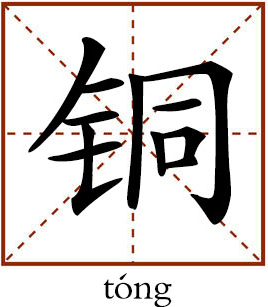copper

This character refers to copper.
铜雀春深锁二乔
tóng què chūn shēn suǒ èr qiáo
Tong refers to “copper” and que “sparrow”. Chun refers to spring and shen “deep.” Suo means “to lock up” and er qiao indicates two sisters of the Qiao family.
This is a line derived from a poem by the Tang Dynasty poet Du Mu (c. 803-852). “A broken halberd was recovered from the bottom of the Yangtze River;/ It was cleaned, polished and examined, and had a tale to tell./ If the easterly wind didn’t help Marshal Zhou set fire to the enemy,/ The two beautiful sisters of Qiao would be captured in the palace of Cao” (trans. Xu Yuanchong & Tang Zidong).
Du wrote this poem when he visited Chibi, or Red Cliffs, an ancient battlefield known for the naval Battle of Red Cliffs, which happened in the winter of 208 BCE. The battle was fought between the allied forces of the southern warlords Sun Quan and Liu Bei against the numerically superior forces of the northern warlord Cao Cao. Cao Cao had chained his ships from stem to stern, possibly aiming to reduce seasickness in his navy. Observing this, commander Huang Gai sent Cao Cao a letter feigning surrender and prepared a squadron of ships which had been converted into fire ships by filling them with bundles of dry reeds and oil. As Huang’s “defecting” squadron approached the midpoint of the river, the sailors applied fire to the ships before escaping in small boats. The unmanned fire ships, carried by the eastern wind, sped towards Cao Cao’s fleet and set it ablaze. Cao’s effort to conquer the land south of the Yangtze River was finally frustrated.
Inspired by a metal artifact remaining from the war, Du imagined another ending of the Battle of Red Cliffs—if there was no eastern wind blowing the fire ships to Cao Cao’s fleet, Zhou Yu, a general serving under Sun Quan who played an important role in defeating Cao Cao at the Battle of Red Cliffs, might have lost the war; and the two beautiful sisters of the Qiao family (the elder married the warlord Sun Ce; the younger married Zhou Yu), might have been captured and locked up in the Tongque Tai, or the Bronze Bird Terrace (in present-day Hebei Province, a palace where Cao Cao sought pleasure in his later years), destined to entertain Cao Cao.
Edited by Ren Guanhong

 PRINT
PRINT CLOSE
CLOSE